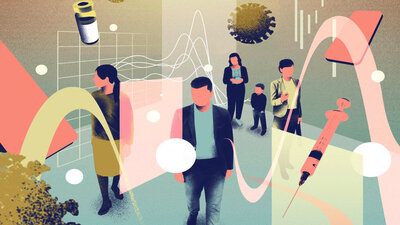How to stay mentally alert - brain goes digital

© Omar Aqil
Are we not all Cyborgs already? Half man, half machine? That was a question a colleague and friend sent me recently when he had to cancel a meeting. To justify the cancellation, he sent two photos: One showed his knee, patched up with plaster. The other one showed the shattered display of his mobile phone. His multi-tasking abilities had failed him when he had tried to walk and google simultaneously: He had tripped over a kerb stone edge. I tried to console him by saying that the technical device, at least, was easily replaceable.
There is no doubt that the digital world creates new dangers. Experts fear the effects might be far more far-reaching than a couple of abrasions.
A Fusion With Technology
Let’s be honest: who does still know the telephone numbers of friends and family off by heart? Instead of learning a couple of phrases in a new language before a foreign holiday, we use a translation programme to help us get along. After work, we are too tired to meet up with a friend. We chat with five acquaintances simultaneously instead. With every app we download, we merge a little further with technology. But what does all that do to us and the body part which does our thinking and feeling – our brain?
Neuroscientists know one thing for sure: The time we spend in front of a screen does shape our thinking processes. Because that is true for everything we do. ‘Our brain changes up until old age’, says the Frankfurt-based neuroscientist Professor Michael Madeja. New neural networks are created, repeated action turns neural dirt tracks into highways. If we neglect an acquired ability, the neural networks weaken. Madeja: ‘The brain is a permanently optimising system. And it optimises according to the demands we make.’ The brain of a passionate internet user will thus look differently to the one of a digital recluse.
Online On Stand-By
The decisive question is: Does the way of life of the Homo Digitalis – the human being in the computer age – impair his or her brain? Researchers have already identified effects one could consider negative in terms of the ability to concentrate. Whether it is at work, at the dinner table with friends or even while asleep: A part of our brain is permanently online – in stand-by modus, so to speak. That is pretty energy-sapping. Experiments have shown that people already do worse in tests when only near their mobile.
Also well-known is the so-called ‘Google effect’ based on trials by US psychologist Betsy Sparrow. According to Sparrow and her trials, our brain goes slack in terms of storing new data as soon as it thinks the data are safely stored digitally.
But what are the consequences of outsourcing parts of our recollection ability into the digital world? The rule of thumb for our brain is ‘use it or lose it’ – so what will get lost?
Some researchers fear for the worst and talk about ‘digital dementia’. The doyen of the doomsayers here in Germany is Professor Manfred Spitzer. His summary: ‘Avoid digital media. They make you – as often shown – fat, stupid, aggressive, lonely, sick, and unhappy.’
Light-Handed Through Computer Games
But fortunately for all those unwilling to forgo their technical ‘body parts’, there are some experts who are more relaxed. One of them is neuroscientist Madeja. Were he to scan his own brain, he would probably find an enlargement in the area responsible for the movement of his fingers, especially eye-finger co-ordination.
Madeja has been playing the piano since his adolescence. ‘Music is also a very one-sided activity that changes the brain a lot’, he says. But while a child is praised for practising sonatas for several hours, his or her parents get nervous if the same child is playing computer games for just one hour. ‘The changes considered positive are mainly determined by society’, says the brain expert.
Objectively, we also gain new abilities while dawdling in front of the screen. It improves our reaction, our fine motor skills, and our ability to take quick decisions. If you are facing minimal-invasive surgery, where the surgical instruments are inserted into the body through a small incision – or ‘keyhole’, you might want to ask the surgeon about his gaming activities.
‘Research has shown that passionate gamers are faster and make less mistakes’, Madeja reports. Also with older people, scientists have found the opposite of ‘digital dementia’. Some studies have shown that gaming even improves our memory. Using a smartphone, however, mainly trains our thumb – used for sending messages and the like.
Children Are More in Danger
Even neuroscientists cannot see it in the brain if somebody uses the net on a daily basis. The brain is challenged in too many different ways. Madeja summarises: ‘Even if you spend plenty of time with social media, it does no harm to the brain. But you change it.’
There is one exception: children. Especially in their first years, they cannot cope well with all the rapid changes of information in the digital world. Studies have shown that an excessive use of media harms young people’s ability to concentrate. ‘A screen in the bedroom is the number one cause for sleep disturbances’, says Madeja.
Some experts like the British neuroscientist Professor Susan Greenfield fear for even more profound effects, for example on our social lives. If you communicate more with your thumb than through eye contact and body language, you fail to practice important interpersonal skills. ‘These are important to understand how other people feel’, says Greenfield.
One consequence: diminishing empathy and intuition, as found by researchers amongst university students. Homo Digitalis is characterised by a higher risk-taking propensity and a lower attention span, according to Greenfield. And a thirst for acknowledgement. An hour without a ‘like’? Homo Digitalis gets frustrated.
If Greenfield’s fears become reality will depend on how long we spend in the digital world. Scientists like the Frankfurt-based development psychologist Professor Yee Lee Shing talk about the ‘Goldilocks range’: Everything above is harmful. Everything below misses out on the positive effects, she says. ‘With digital media, the ideal range for adolescents seems to be somewhere between one and four hours.’ Shing bases this on a study involving over 120,000 internet users. It does differ from user to user, however. And it also depends on what one does in the digital world.
Digital Life Mirrors Reality
Negative effects from the overuse of social media show up earlier than those from too much gaming. Also important are the experiences children make in the real world. If you experience bullying in school, you are more likely to experience the same on Facebook et al. If you fall into bad company in life because you lack positive support, the same might happen online. ‘The digital experience mirrors real life’, says Shing. If such a differentiation is even useful still: ‘Our real life also happens online today.’
If the visions of the big tech companies become reality, real life could soon be moved into cyberspace to an even greater extent. Dr Eike Wenzel, head of the Institute for Trend Research and Futurology in Heidelberg, has been observing the development of social media for over twenty years. ‘Back then, people spent about three hours on average in front of a screen – and we thought an upper limit was reached’, he says.
By now, the time in front of a screen has almost doubled in the USA – and is still rising. Digital companies are working on virtual metaverses where all our digital spaces come together and are merged – via data goggles – with our reality. ‘We would then not communicate via video conference but meet instead in my room where my avatar – my virtual deputy – would expect you’, Wenzel says. If this is really going to happen, even futurologists don’t know yet. But one thing is sure: Our old-fashioned analogous brain has a lot of spare capacity for whatever is in line for us in the digital world.






